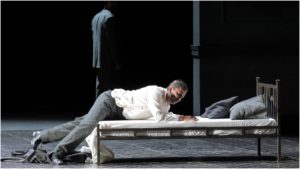
Opera Profile: ‘Otello,’ Verdi’s Final Tragic Masterpiece
By David SalazarWhen it comes to contesting which of Verdi’s operas is his greatest, “Otello” usually ranks amongst the top two or three.
This work of supreme genius almost never came about as the composer had retired after creating “Aida” in 1871. But with the combined efforts of his Milan publisher Giulio Ricordi and librettist Arrigo Boito, Verdi came out of retirement and created the music for “Otello,” which had its world premiere on Feb. 5, 1887.
Since then, the opera has been a staple of the repertory with many of the world’s greatest tenors taking on the role as a star vehicle.
Short Plot Summary
On the Island of Cyprus, Otello emerges victor from a battle with the moors and goes off to celebrate with his wife Desdemona. The villainous Jago, feeling slighted by Otello for picking the younger Cassio as the Captain. He plots with Rodrigo to bring them all down and subsequently gets Cassio in a drunk stupor that sets off Cassio amongst the people.
Otello arrives and stops everyone in their tracks. He removed Cassio from his post and shares an intimate moment with Desdemona.
Jago convinces Cassio to talk to Desdemona to get Otello to change his mind. Cassio approaches her and as he does, Otello notices the exchange. Jago suggests that Cassio and Desdemona might be up to no good, enraging Otello who is now suspecting of her infidelity. When Desdemona comes to Otello to ask that he forgive Cassio, he rejects her, throwing a handkerchief to the ground. Emilia, Desdemona lady-in-waiting and Jago’s wife picks it up; Jago steals it from her. Jago then suggests that he overheard Cassio talking in his sleep about his passion for Desdemona and then tells Otello that he saw Cassio with the handkerchief. Enraged, Otello swears vengeance.
He confronts Desdemona and accuses her of infidelity. Then he watches from afar as Cassio reveals the handkerchief to Jago. When Cassio is gone, Jago suggests Otello strangle Desdemona in her bed. At an ensuing scene with the Venetian ambassador, Otello reveals that he has been recalled to Venice and then proceeds to humiliate Desdemona in public. He sends everyone away and suddenly collapses.
Desdemona senses that she might be doomed and prays for her soul. Otello arrives and kills her. Emilia discovers the crime and calls on the others for support. They all reveal Jago’s lies and evil and Otello, realizing the error of his ways, kills himself.
Major Numbers
Otello is one of those operas that has more hit numbers than people realize. It all starts with Otello’s famed entrance “Esultate;” despite its brief length (it can last a little over 30 seconds), it packs a punch dramatically. The love duet “Gia nella notte densa” is often performed by sopranos and tenors in concert performance, as is the ending of the second Act, “Si pel ciel.”
Jago’s “Credo” is arguably the most famous aria in the work, but Otello’s two big solos, “Dio mi potevi” and “Niun mi tema” are quite beloved. Finally, Desdemona’s own Willow Song and “Ave Maria” are touchstones of Verdi’s supreme writing for the soprano.
Read More on “Otello”
The Bel Canto Traditions Laden in the Opera
The Religious Structure of “Otello”
Watch and Listen
Here is a famed recording starring Jon Vickers in the title role under the baton of Tullio Serafin.
And here is one of Plácido Domingo’s most famed interpretations from La Scala under Carlos Kleiber.
Categories
Opera Wiki

